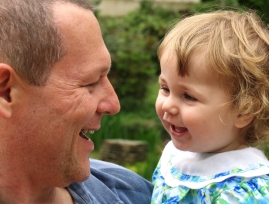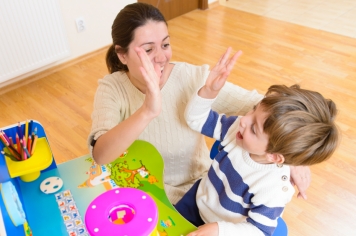 The words we speak to children have the power to convey love, acceptance, and care. When children are raised in an environment of positive reinforcement and support, they learn to give those gifts to each other. Research has repeatedly shown that these same children are better able to learn effectively and develop skills that will help them become successful adults and members of society.
The words we speak to children have the power to convey love, acceptance, and care. When children are raised in an environment of positive reinforcement and support, they learn to give those gifts to each other. Research has repeatedly shown that these same children are better able to learn effectively and develop skills that will help them become successful adults and members of society.
Words can also hurt children and seriously damage their self-esteem, impacting their lives for years to come. Words spoken by people in positions of authority, such as parents, teachers, caregivers, and peers, have the potential to be especially detrimental. Hurtful words can lead to depression, heart disease, stress, and even aggression.
Research has shown that a few kind words can boost spirits and feelings of happiness. Children, in particular, respond well to enthusiastic and positive reinforcement. In their innocence, they believe what we say, unless given reason not to. When we share good things about their accomplishments and behavior, they readily accept that praise.
 However, it is important that the praise contain content that is reflective and genuine. When we primarily praise with empty phrases (“Good job,” “That’s nice,” etc.) we are not offering enough detail to be helpful. Offer praise that describes the values you want your child to internalize (working hard, putting forth effort, taking initiative, having curiosity, etc.), but does not label your child or focus on level of performance. (Click here for a conversation about appropriate, effective praise.)
However, it is important that the praise contain content that is reflective and genuine. When we primarily praise with empty phrases (“Good job,” “That’s nice,” etc.) we are not offering enough detail to be helpful. Offer praise that describes the values you want your child to internalize (working hard, putting forth effort, taking initiative, having curiosity, etc.), but does not label your child or focus on level of performance. (Click here for a conversation about appropriate, effective praise.)
Promote harmony in your family life and with peers by keeping the following things in mind:
- Kids don’t miss a thing. Set good examples in your speech and tone of voice.
- Never use humor to put others down, especially your spouse or children. And remember, what goes around, comes around.
- A harsh word, said in haste, is hard to erase. Count to ten and think of a way to say it nicely.
- Communicate with your spouse and family with kind and supportive words. Try to keep things positive to eliminate opportunities for hurt and gossip.
- Never say derogatory things about yourself. People might agree.
- To have a family who doesn’t gossip about you, you must be a family member who doesn’t gossip about them.
- Listen to problems, but remember that there are two sides to every story.
- When you disagree with someone, do it with respect, and set out to solve the problem, not win. This helps everyone come out on top!
The following poem is a good reminder of how children learn about their environment and world.
Children Learn What They Live
By Dorothy Law Nolte
If children live with criticism,
they learn to condemn.
If children live with hostility,
they learn to fight.
If children live with ridicule,
they learn to be shy.
If children live with shame,
they learn to feel guilty.
If children live with encouragement,
they learn confidence.
If children live with tolerance,
they learn to be patient.
If children live with praise,
they learn to appreciate.
If children live with acceptance,
they learn to love.
If children live with approval,
they learn to like themselves.
If children live with honesty,
they learn truthfulness.
If children live with security,
they learn to have faith in themselves and others.
If children live with friendliness,
they learn the world is a nice place in which to live.
Back to blog listing